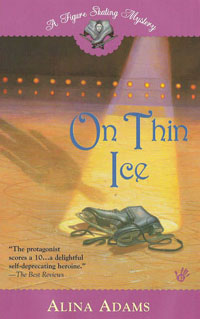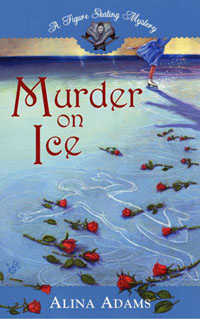COUNTRY HOPPING
As U.S. Champion Tanith Belbin continues her fight to acquire U.S. citizenship prior to the Turino Olympics, FigureSkatingMystery.com takes a look back at some skaters who have actually ditched American (and other) citizenships in exchange for their own dreams of glory.
Because, while powerhouse countries like the U.S. and Russia always have more deserving skaters than they have slots for their World and Olympic teams (though Russian Federation president fears that soon might not be the case), many smaller countries have to scramble just to field a single, adequate entry.
As a result, good skaters who regularly find themselves just barely missing a spot on their nation's podium periodically decide to cheat their way into international competition, and begin desperately searching for another local to hitch their star to.
American-born Dianne DeLeeuw won the 1975 World Championships representing her mother's homeland, the Netherlands.
Before she became the 1997 U.S. Pair Champion with her partner Jason Dungjen and then a 2002 World Bronze Medalist with John Zimmerman, Tokyo-born Kyoko Ina finished 4th as a Single at the 1987 Japanese Nationals, though she confesses, "I felt like an outsider. I grew up in America and to go to another country to compete didn't feel right."
1990 U.S. Junior Champion Alice Sue Clayes decided there was too much competition at the Senior level and began skating for Belgium, qualifying because one of her grandparents had been born there. She finished 7th at the 1992 Worlds (behind all three of the American ladies) and 19th in 1994.
U.S. Pair Champion and World Pair Bronze Medalist Todd Sand once represented Denmark as a singles skater. He was 22nd at the 1982 World Championship.
Trifun Zivanovic was 19th as an American at Worlds in 1999. And 29th representing his father's home country, Serbia, in 2004.
Canadians Isabelle & Paul Duchesnay became the 1991 World Ice Dance Champions skating under the French flag. Their countrymen, Allison MacLean & Konrad Schaub, represented Austria at the 1996 Worlds.
And, through a series of gyrations, Tokyo-born, one time U.S. competitor Kaho Kainuma managed to make herself a member of the 1997 Armenian Team, where her primary competition for the spot came from Jennifer Goolsbee, an American who'd once surrendered her own citizenship to represent Germany.
But, merry-go-round nationality was nothing new to Jennifer.
After finishing 9th at the 1994 Olympics with German partner Hendryk Schamberger, Jennifer gave up her German citizenship when Hendryk retired from skating to go to medical school. Then, Jennifer paired up with the USSR's 1991 Skate America Champion, Samuel Gezalian.
Samuel, the son of a Jewish mother and an Armenian father, had earlier turned down a chance to skate for Israel in order to take advantage of his then-partner, Tatiana Navka's, Byelorussian citizenship. (Navka is currently the reigning World Champion from Russia, with partner Roman Kostomarov).
When Samuel and Navka's Byelorussian partnership broke up, Samuel teamed up with Jennifer to represent Germany. They won the 1997 German Nationals, but it turned out that Jennifer no longer held the citizenship necessary to represent the country at Worlds.
Jennifer reapplied for her ID, but the German government, fed up with her capriciousness, refused. Jennifer and Samuel then promptly decided to turn Armenian in time for the 1998 Olympics. But, the Armenians weren't buying, either.
For skaters from the former USSR eager to try the same trick, the collapse of the Soviet Union offered a host of new Republics to choose from.
Russian Igor Pashkevitch declared himself a citizen of Azerbaijan, as did the equally ethnic Russian, Yulia Vorobieva.
And if no republic was available, a neighboring nation would do.
Moscow's Julia Lautowa moved to Austria with her coach, lived in Vienna just long enough to acquire her citizenship and win the Austrian title, then returned home, continuing to train in Moscow while representing Austria. In 2004, she was 25th at the World Championship.
Andrei Vlachtchenko, a Ukrainian born in Germany while his father served there with the occupying Soviet Army, first represented the USSR, then his mother's home, Latvia, before seeking German citizenship in 1994. He represented Germany at the 1996 and 1997 Worlds and was looking forward to the 1998 Olympics when a second drunk driving conviction (the first came in 1995) stripped him of his German passport.
Currently, Russian-born Israeli Champion Roman Serov is having some citizenship problems of his own.
Because, while powerhouse countries like the U.S. and Russia always have more deserving skaters than they have slots for their World and Olympic teams (though Russian Federation president fears that soon might not be the case), many smaller countries have to scramble just to field a single, adequate entry.
As a result, good skaters who regularly find themselves just barely missing a spot on their nation's podium periodically decide to cheat their way into international competition, and begin desperately searching for another local to hitch their star to.
American-born Dianne DeLeeuw won the 1975 World Championships representing her mother's homeland, the Netherlands.
Before she became the 1997 U.S. Pair Champion with her partner Jason Dungjen and then a 2002 World Bronze Medalist with John Zimmerman, Tokyo-born Kyoko Ina finished 4th as a Single at the 1987 Japanese Nationals, though she confesses, "I felt like an outsider. I grew up in America and to go to another country to compete didn't feel right."
1990 U.S. Junior Champion Alice Sue Clayes decided there was too much competition at the Senior level and began skating for Belgium, qualifying because one of her grandparents had been born there. She finished 7th at the 1992 Worlds (behind all three of the American ladies) and 19th in 1994.
U.S. Pair Champion and World Pair Bronze Medalist Todd Sand once represented Denmark as a singles skater. He was 22nd at the 1982 World Championship.
Trifun Zivanovic was 19th as an American at Worlds in 1999. And 29th representing his father's home country, Serbia, in 2004.
Canadians Isabelle & Paul Duchesnay became the 1991 World Ice Dance Champions skating under the French flag. Their countrymen, Allison MacLean & Konrad Schaub, represented Austria at the 1996 Worlds.
And, through a series of gyrations, Tokyo-born, one time U.S. competitor Kaho Kainuma managed to make herself a member of the 1997 Armenian Team, where her primary competition for the spot came from Jennifer Goolsbee, an American who'd once surrendered her own citizenship to represent Germany.
But, merry-go-round nationality was nothing new to Jennifer.
After finishing 9th at the 1994 Olympics with German partner Hendryk Schamberger, Jennifer gave up her German citizenship when Hendryk retired from skating to go to medical school. Then, Jennifer paired up with the USSR's 1991 Skate America Champion, Samuel Gezalian.
Samuel, the son of a Jewish mother and an Armenian father, had earlier turned down a chance to skate for Israel in order to take advantage of his then-partner, Tatiana Navka's, Byelorussian citizenship. (Navka is currently the reigning World Champion from Russia, with partner Roman Kostomarov).
When Samuel and Navka's Byelorussian partnership broke up, Samuel teamed up with Jennifer to represent Germany. They won the 1997 German Nationals, but it turned out that Jennifer no longer held the citizenship necessary to represent the country at Worlds.
Jennifer reapplied for her ID, but the German government, fed up with her capriciousness, refused. Jennifer and Samuel then promptly decided to turn Armenian in time for the 1998 Olympics. But, the Armenians weren't buying, either.
For skaters from the former USSR eager to try the same trick, the collapse of the Soviet Union offered a host of new Republics to choose from.
Russian Igor Pashkevitch declared himself a citizen of Azerbaijan, as did the equally ethnic Russian, Yulia Vorobieva.
And if no republic was available, a neighboring nation would do.
Moscow's Julia Lautowa moved to Austria with her coach, lived in Vienna just long enough to acquire her citizenship and win the Austrian title, then returned home, continuing to train in Moscow while representing Austria. In 2004, she was 25th at the World Championship.
Andrei Vlachtchenko, a Ukrainian born in Germany while his father served there with the occupying Soviet Army, first represented the USSR, then his mother's home, Latvia, before seeking German citizenship in 1994. He represented Germany at the 1996 and 1997 Worlds and was looking forward to the 1998 Olympics when a second drunk driving conviction (the first came in 1995) stripped him of his German passport.
Currently, Russian-born Israeli Champion Roman Serov is having some citizenship problems of his own.






0 Comments:
Post a Comment
Links to this post:
Create a Link
<< Home